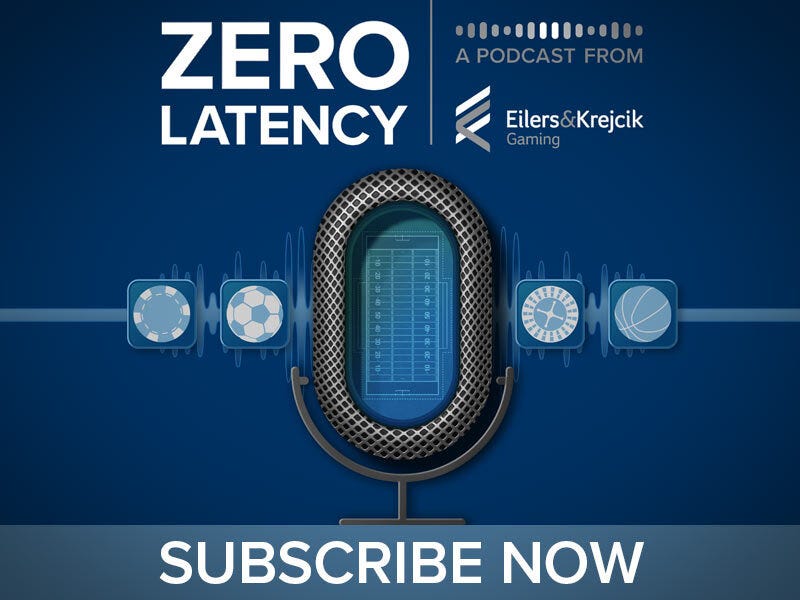Gimme One Reason To Stay Here
Bettor behaviors and legalization’s impact on black markets is complex, evidenced by the many bettors in regulated markets who continue using unregulated sites.
The Bulletin Board
THE LEDE: Canadian survey highlights the challenges regulated markets face.
COUNTERPOINT: Does legalization impact the black market?
ROUNDUP: Online lottery developments in LA, OK, and IL; Vixio looks at iLottery’s slow but steady progress; GLPI joins NAAiG.
VIEWS: The latest on New York’s downstate casinos.
AROUND the WATERCOOLER: DraftKings starts a political action committee and the Moby Dick of sports betting.
STRAY THOUGHTS: Isai Scheinberg, Phil Galfond, and Branch Rickey.
Sponsor’s Message: Increase Operator Margins with EDGE Boost Today!
EDGE Boost is the first dedicated bank account for bettors.
Increase Cash Access: On/Offline with $250k/day debit limits
No Integration or Costs: Compatible today with all operators via VISA debit rails
Incremental Non-Gaming Revenue: Up to 1% operator rebate on transactions
Lower Costs: Increase debit throughput to reduce costs against ACH/Wallets
Eliminate Chargebacks and Disputes
Eliminate Debit Declines
Built-in Responsible Gaming tools
To learn more, contact Matthew Cullen, Chief Strategy Officer, Matthew@edgemarkets.io
The Lede: What Happens When Bettors Lack Choice
New polling conducted by Ipsos that was commissioned by the Canadian Gaming Association (CGA) has some interesting findings when it comes the behaviors of bettors in Alberta and British Columbia.
According to the Ipsos poll (h/t to Canadian Gaming Business), 77.3% of Alberta gamblers exclusively used unregulated sites in the previous three months, while 10.4% exclusively used the government-regulated, Play Alberta, site. 12.3% of respondents said they use a mix of the two.
The results were a little better for British Columbia’s government-regulated site, PlayNow, where 23.9% gambled exclusively on PlayNow, 60.4% exclusively used unregulated sites, and 15.6% used a combination of the two.
The poll results in both provinces indicates consumer confusion about which sites are legal and which aren’t (51% and 55% of customers using unregulated sites believed they were betting through regulated sites).
But confusion doesn’t wholly explain the popularity of unregulated sites, nor does it explain why bettors are more likely to use British Columbia’s sole regulated site over twice as often as Alberta’s.
Beyond confusion, unregulated sites attract bettors with bonuses, tailored user experiences, and a better selection of games and wager types. While legal status is important to many bettors, they will balance that with choice, convenience, and competitive offerings.
One explanation for the disparity between Alberta and British Columbia is the level of market maturity. British Columbia’s PlayNow has been operational since 2004 (Play Alberta, launched in 2020), giving it a longer runway to build trust and brand recognition. Still, other factors, including marketing, user experience (UX), and game options, are likely playing a role — look no further than the disparate results of 888 and Rush Street Interactive in Delaware for evidence.
The takeaway should be that bettors will find what they want to gamble on, and operators, white, gray, or black, will step in to meet the demand. The answer isn’t prohibition or overly restrictive policies. The answer is a competitive, well-regulated ecosystem, which is precisely what Alberta recently authorized. But even then, the black (and gray) market will persist, evidenced by the need to send cease-and-desist orders sent to offshore and sweepstakes operators in legal online gambling states.
Counterpoint: Does Legalization Impact the Black Market?
In an opinion column published in the Baltimore Sun, Maryland State Del. Kathy Szeliga pushed back on the idea that states resisting online casino legalization are being shortsighted:
“In one recent commentary by Jeff Ifrah, a consultant for the iGaming industry, the author states that opposition to casino gambling on smartphones is shortsighted,” with claims of personal, societal, and economic harms “wildly off-base.”
“As a steward of Maryland’s economy and advocate for its citizens, I have serious concerns about legalizing iGaming in Maryland and can see that it is a serious threat,” Szeliga writes. “What is truly 'shortsighted' is the danger of trapping our residents, especially teens, young adults, and those in minority communities, in the crushing addiction and financial ruin that follows from iGaming.”
The column goes on to cite studies and research, continuing the unwinnable, ‘you have your facts, I have mine’ debate.
“Ifrah’s citation of a study funded by pro-iGaming interests cannot change reality nor convince us of any benefits to legalizing online gambling in Maryland,” Szeliga claims. “As state leaders, we don’t enjoy the same luxury Ifrah has of ignoring the hundreds of millions of dollars in social costs that iGaming will inflict on our state, our local communities, and Maryland families. Common sense, not special interest spin, must prevail.”
There is nothing new or groundbreaking in either side’s talking points. However, a line about the black market jumped out at me:
“Another baseless argument is that legalizing iGaming will shrink or eliminate the illegal market. Multiple studies and plain common sense show the opposite is true. Legalizing iGaming expands the illegal marketplace. Constant ads for regulated online gambling desensitize the public to gambling and make it easier for illegal operators to confuse consumers.”
Szeliga’s claim that legalizing iGaming doesn’t disrupt the illegal market stands out. Pervasive ads for regulated gambling definitely normalize betting and blur lines, and enable illegal operators to lure consumers.
But it goes beyond confusion. Journalist David Hill, citing offshore sportsbooks in Costa Rica, noted that while PASPA’s repeal initially hurt their business, players are returning due to restrictions in legal US markets.
As I’ve posited in the past, this raises questions:
Is the legal market growing by converting black-market bettors, or is it creating new ones, potentially amplifying harm?
SPONSOR’S MESSAGE - Kambi is the industry’s leading independent provider of premium sports betting technology and services. Trusted by dozens of operators worldwide, each benefitting from the power of Kambi’s global network, Kambi has a proven track record of giving partners the decisive competitive edge required to grow and outperform the market.
As the home of premium sports betting solutions, Kambi offers an expansive product portfolio that caters to the evolving needs of operators and players alike. At its core is Kambi's flagship Turnkey Sportsbook, renowned for its scalability, flexibility, and unrivaled track record of delivering world-class betting experiences globally. Complementing this are Kambi’s cutting-edge standalone products: Odds Feed+, Managed Trading, Sportsbook Platform, Bet Builder, Esports, and Front End.
The (Mostly Lottery) Roundup: Developments in LA, OK, and IL; Vixio Looks at iLottery’s Progress; GLPI Joins NAAiG
Louisiana legislature looks into online lottery sales [HR 217]: Online lottery efforts are afoot in Louisiana, with Rep. Vanessa LaFleur’s HR 217 unanimously passed by the House. The bill “requests a study of the feasibility of the purchase of certain lottery tickets through the internet.” It was unanimously passed by the House on June 10 and signed by the Speaker of the House. LaFleur believes that online lottery sales could generate an additional $23 million to $24 million in annual funding for the state.
Oklahoma inches towards online lottery sales [KFOR.com]: The Oklahoma Lottery Commission is looking to update its digital platform in hopes of improving its loyalty program and providing a ticket scanner, as well as a retail store locator. These updates would open the door to pursuing online sales by the commission “if granted legislative authority in the future.”
Illinois extends online lottery sales through 2030 [Lottery Geeks]: Illinois lawmakers extended the sunset date for online lottery sales last week. Online sales were set to sunset on July 1, 2025, but have now been extended to December 31, 2030, through Senate Bill 2456. It was passed in the House on May 30, then passed in the Senate. The move isn’t surprising, as online sales reached approximately $686 million in Fiscal Year 2024, resulting in a record-breaking year of overall sales ($3.86 billion) for the Illinois Lottery.
iLottery quietly makes progress [Vixio]: As Vixio (a newsletter sponsor) noted in its most recent US Online Outlook, the “iLottery market has been gradually securing a broader footprint with e-instant games now available in a total of ten states, plus Washington, DC. Within the past year, iLottery offerings have been launched or expanded in North Carolina, Connecticut, West Virginia, and Kansas, the latter two of which are without explicit legislative approval.” There is also the pending launch in Massachusetts, which legalized iLottery in 2024.
GLPI joins anti-online gambling group, NAAiG [Casino.org]: “Gaming and Leisure Properties, Inc. (GLPI), the real estate investment trust spun off from Penn Entertainment in November 2013, has joined an advocacy lobbying state lawmakers to oppose the liberalization of iGaming.” NAAiG Board Member Mark Stewart said, “GLPI’s decision to join NAAiG underscores the growing consensus across the industry that iGaming’s risks are real and far-reaching.”
Views: Updated New York Casino Rankings
The June 27 application deadline for New York casino proposals is just around the corner, but before I jump into my updated rankings, I want to highlight two columns from Casino Reports that offer alternative perspectives (we all agree that the Empire City and Resorts World bids are clear frontrunners).
Ranking The 8 Remaining Contenders For The New York City-Area Casino Licenses, by Jeff Edelstein
Counterpoint: An Alternate Ranking Of The 8 Expected New York Casino Bids, by Chris Altruda
One bit of news that will impact all proposals is recent vote by the New York State Gaming Commission’s Gaming Facility Location Board requiring a $500 million licence fee and a $500 million minimum capital investment — which every bid meets.
MGM Empire City (Yonkers)
Casino Company (Operator): MGM Resorts International
Online legalization impact: Positive
MGM Empire City in Yonkers, a frontrunner for one of three downstate New York casino licenses, leverages its established gaming operations and proximity to New York City. The proposal, benefiting from existing infrastructure and a strong market presence, faces no significant reported hurdles, positioning it as a near-certain pick. Yonkers Mayor Mike Spano urged the New York State Gaming Commission to expedite license awards before potential economic dips, reinforcing its strong position. However, competition for licenses remains intense.
2. Resorts World (Queens)
Casino Company (Operator): Genting Group
Online legalization impact: Neutral
Resorts World in Queens, a leading candidate for a New York casino license, stands out with its robust gaming facilities and strong community backing in the borough. The proposal, anchored by operational experience and a strategic location, is well-positioned to secure one of the three licenses. Challenges are minimal.
3. Steve Cohen-Hard Rock International (Citi Field, Queens)
Casino Company (Operator): Hard Rock International
Online legalization impact: Positive
Steve Cohen and Hard Rock International’s $8 billion entertainment complex, located near Citi Field, is a strong contender for the third New York casino license. The complex features a casino, a 1,000-room hotel, public amenities, and 100 off-site affordable apartments. The New York State Assembly’s passage of a parkland alienation bill on May 13, 2025. The Senate approving the zoning changes on May 27. The bill allows development on the parkland surrounding Citi Field. The project continues to pick up key supporters, and Cohen’s team has also lobbied against Bally’s Bronx bid ahead of a key City Council vote, indicating aggressive competition tactics.
4. SL Green and Caesars Entertainment (Times Square, Manhattan)
Casino Company (Operator): Caesars Entertainment
Online legalization impact: Positive
Roc Nation, SL Green, and Caesars Entertainment’s 250,000-square-foot Times Square casino proposal, deemed a viable candidate by STTP last month, is the strongest of Manhattan’s bids for a New York casino license. Per the New York Post, “Sources said Jay-Z [one of the investors] was in the capital to discuss the glittering casino plan.” The effort has garnered some local and union support. However, “The odds could be long,” according to the Post. “I don’t think there is going to be a casino in Manhattan,” John Sabini, former chairman of the state racing and wagering board, told the Post. STTP Thoughts: Its high-visibility location and major gaming partnership are key strengths, but delayed environmental reviews by the state’s Gaming Commission risk disqualification.
5. Soloviev Group (East River, Manhattan)
Casino Company (Operator): Mohegan Gaming
Online legalization impact: Neutral to Positive
Soloviev Group’s proposed mixed-use complex near the United Nations, a long-shot candidate for a New York casino license, features a casino, 1,325 apartments, a museum, and 4.7 acres of East River green space. A novel plan to offer partial ownership to New Yorkers aims to counter local opposition, but delays in environmental reviews and competition from stronger bids weaken its prospects.
6. Silverstein Properties and Greenwood Gaming (Avenir, Manhattan)
Casino Company (Operator): Greenwood Gaming and Rush Street Gaming
Online legalization impact: Neutral to Slightly Positive
Silverstein Properties, in partnership with Greenwood Gaming and now Rush Street Gaming, is advancing its $1.8 billion Avenir proposal — a high-end casino and 46-story mixed-use complex located at 11th Avenue and 41st Street in Manhattan. This project, one of four Manhattan-based bids for one of three downstate New York casino licenses, should receive a slight boost from Rush Street’s involvement. The bid recently unveiled high-profile restaurant partners, including Michelin-starred chefs, to enhance its appeal. Manhattan Borough President Mark Levine praised Avenir’s economic potential but still flagged concerns about traffic and infrastructure. Avenir faces environmental review delays plaguing Manhattan bids, which could hinder its competitiveness against rivals like Jay-Z’s Roc Nation and Caesars in Times Square.
7. Bally’s Links at Ferry Point (Bronx)
Casino Company (Operator): Bally’s
Online legalization impact: Positive
Bally’s Links at Ferry Point is another longshot proposal for a New York casino license. Located at the former Trump golf course in the Bronx, it faces significant challenges, including a community board rejection driven by concerns over the loss of parkland and the minimal benefits it would provide, which, combined with Bally’s operational issues in Chicago, severely undermines its bid. Still, the New York City Council recently recommended allowing Bally’s to use public parkland for the $4 billion casino, following a last-minute push by Mayor Eric Adams, who issued a home rule order reducing the required council votes from 34 to 26. Bally’s Chairman Soo Kim cried foul after the city council delayed a vote on May 28, alleging a whisper campaign by competitors: “They’re saying, ‘If Bally’s wins, Trump benefits.’ That’s crazy,” Kim told The New York Post.
8. The Coney (Coney Island, Brooklyn)
Casino Company (Operator): Saratoga Casino Holdings
Online legalization impact: Neutral to Negative
The Coney, a joint venture between Thor Equities, Legends Entertainment, the Chickasaw Nation, and Saratoga Casino Holdings, received a slight boost following a critical city approval vote. However, strong local opposition and a contentious public hearing highlight significant hurdles in overcoming community resistance and competing proposals.
[WITHDRAWN] Wynn New York City (Hudson Yards, Manhattan)
The proposal: Wynn New York City’s $12 billion Hudson Yards proposal included a casino, 1,500 housing units (324 of which are affordable), a 5.6-acre park, a K-8 school, and a 1,750-room hotel. Enhanced community benefits aim to counter strong local opposition (reported by STTP), but despite being the most ambitious project, zoning changes and City Council approval requirements turned it into a sinking ship, which was withdrawn earlier this week due to “persistent opposition.”
[WITHDRAWN] Sands New York (Nassau County)
The proposal: Las Vegas Sands’ proposed resort at the Nassau Veterans Memorial Coliseum site includes a casino, hotels, convention space, and a luxury spa, with gaming as just 10% of the project. When it withdrew, the company cited the threat of online gambling: “As we previously stated, the company remains concerned about the potential impact of the legalization of igaming on the overall market opportunity and project returns,” LVS President Patrick Dumont said during the company’s recent earnings call. A recent report from Newsday cast doubt on the idea of DraftKings taking over the project: "There is no deal between the companies nor will there be," a source told Newsday. "DraftKings will not be taking over the Sands bid."
[WITHDRAWN] Saks Fifth Avenue (Manhattan)
The proposal: Hudson’s Bay Company's proposal would convert the top three floors of its flagship Saks store into a 200,000-square-foot luxury casino.
SPONSOR’S MESSAGE - Episode 76: Are Sportsbooks wrong about structural hold?
Host Brad Allen is joined by Alun Bowden and former Fanatics trading SVP Andy Wright to discuss:
Recent analyst questions about sportsbooks missing hold expectations
Whether there are holes in SGP pricing
Why books might have a messaging problem
Listen to the episode here.
Around the Watercooler
Social media conversations, rumors, and gossip.
File this one under interesting but not overly surprising.
And remember the “whale” that sent Fanatics’ New Jersey betting handle into the stratosphere last year?
Stray Thoughts
Yesterday, I partook in the airing of grievances, and in the words of Frank Costanza, “I got a lot of problems” with the Poker Hall of Fame.
Today, I want to illustrate just how flawed the current process is by examining the current finalists.
Here are the ten finalists: Jeremy Ausmus, “Miami” John Cernuto, Ted Forrest, Phil Galfond, Kathy Liebert, Mike Matusow, Matt Savage, Isai Scheinberg, Nick Schulman, and Scott Seiver.
Everyone on the list has a solid case for induction. Kathy Liebert is one of, if not the best, female poker players of all time. Matt Savage is the poker equivalent of Red Auerbach. Isai is a Branch Rickey or George Halas-like transformational figure in the poker world. Schulman, Ausmus, and Seiver are absolute crushers. Forrest, Miami John, and Matusow were All-Stars with MVP-type seasons, both before and at the beginning of the poker boom.
But if you can only have one, how can you not pick Galfond? And because the poker boom was, well, a boom, there is going to be another sure-fire first-ballot hall-of-famer turning 40 every year from now on, which means the backlog isn’t going to go away, it’s going to get worse. So until things change, or the voting committee decides to prioritize age, everyone else is going to have to settle for the title “perennial nominee.”









